#tatiana rusesabagina
Explore tagged Tumblr posts
Text








SOPHIE OKONEDO as Tatiana Rusesabagina in HOTEL RWANDA (2004)
#sophie okonedo#tatiana rusesabagina#hotel rwanda#filmedit#cinematv#gif#mine#*#film*#so*#sophie okonedo saturday#that's my oscar nominee!!
63 notes
·
View notes
Text
Hotel Rwanda
You know that movie about the hotel in Rwanda during the genocide? Yeah, that's the one. Hotel Rwanda is an absolute gem of a film that left me speechless after my first viewing, and it still hits me hard every time I watch it. Some people might think it's just another sad story from Africa, but they're missing out on a powerful, heart-wrenching experience.
Hotel Rwanda is set during the 1994 Rwandan genocide, when the Hutu-led government ordered the mass slaughter of Tutsis. Don Cheadle stars as Paul Rusesabagina, the manager of the Hotel des Mille Collines in Kigali, who saves more than a thousand lives by providing shelter to Tutsis and moderate Hutus in his hotel. The movie is a masterclass in storytelling and tension-building, thanks to director Terry George.
George uses various film techniques to create a sense of realism and urgency. He chooses to shoot the movie mostly handheld, giving it a documentary-like feel that makes the events seem more immediate and personal. The color palette is dominated by earthy tones, reflecting the grim reality of the situation, while the occasional bright spots of color serve as a reminder of the humanity that still exists amid the chaos.
The movie's pacing is also carefully crafted to keep you on the edge of your seat. As the situation deteriorates, we see Paul struggling to maintain control and protect those he's responsible for. The tension keeps building, with moments of hope and despair coming in quick succession, leaving you emotionally drained by the end.
Hotel Rwanda's success is due in large part to the incredible performances from its cast. Don Cheadle delivers a tour de force as Paul, showing the full range of his character's emotions, from fear and desperation to determination and strength. Sophie Okonedo, as Paul's wife Tatiana, also gives a heartrending performance, while the supporting cast brings depth and nuance to their roles.
One of the most impressive aspects of Hotel Rwanda is how it balances the brutality of the genocide with the human stories at its core. The film doesn't shy away from showing the horrors of the event, but it also focuses on the resilience and courage of those who fought to survive and save others. This delicate balance is a testament to Terry George's skill as a director.
In conclusion, Hotel Rwanda is a must-watch film for anyone interested in understanding the Rwandan genocide and the power of human compassion. It's a harrowing, emotional journey that will stay with you long after the credits roll. And even if you're not into heavy historical dramas, the captivating performances and gripping storytelling make it worth your time. Trust me, this is one movie you won't soon forget.
It earns an 8/10 on the scale of genocide themed movies :)

2 notes
·
View notes
Text
Review of “Hotel Rwanda” (2004)
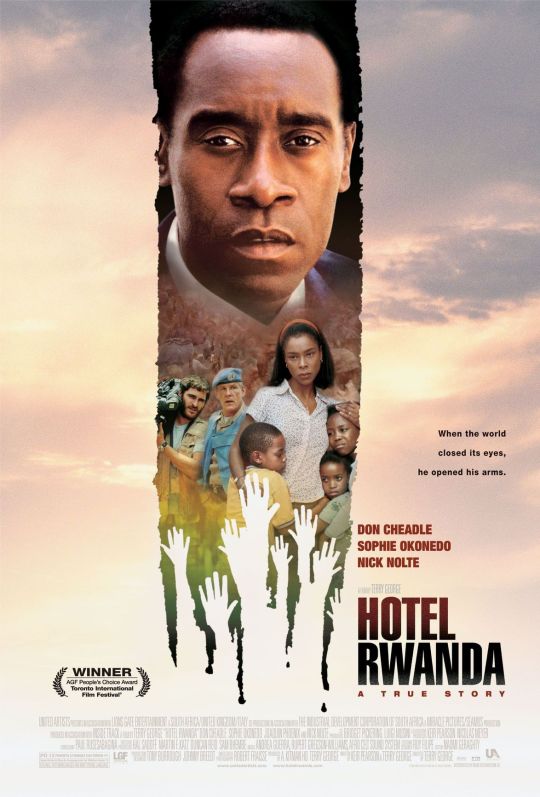
*SPOILER ALERT* - This review contains spoilers about Hotel Rwanda (2004).
After the President’s plane is shot down, tensions rise between the corrupt Hutu government and the Tutsi rebels of Rwanda. This sparks a genocide of hundreds of thousands of Tutsi and moderate Hutu people, at the hands of the large Hutu militia. Based on a true story, Hotel Rwanda (2004) details the actions of Paul Rusesabagina (Don Cheadle) when the Hotel Des Mille Collines, which he manages, becomes a hideout for refugees during the Rwandan genocide of 1994. Paul is Hutu but his wife, Tatiana (Sophie Okonedo), is Tutsi so he must protect her and his family, as well as more than one thousand other refugees, through quick thinking and intelligent diversions.
The film begins with a black screen, while a dark and ominous message of anti-Tutsi propaganda is heard. This is a radio broadcast; one of many heard throughout the film. It’s one of the primary ways that the Hutu militia gains traction and support as the events unfold, but it also plays an important part in the storytelling of the film. The establishment of these radio broadcasts right at the beginning of the film, despite the fact that the genocide hasn’t necessarily begun yet, is quite effective, as these broadcasts are symbolic of fear and negativity. The ominousness in the first scene allows the audience to feel the sense of dread and loss of hope that the characters of the film must be feeling every time a message like this is broadcast, and also foreshadows the mood of later parts of the film.
Speaking of mood, early scenes in this movie contain plenty of bright and colourful imagery. Crowded and lively city streets start the film off with a look at Rwandan culture as it was before the genocide. This is in stark contrast to the rest of the film, as the tone continuously gets darker and more dire as the story progresses. The use of contrasting visuals was a good idea on behalf of the filmmakers, as they are representative of the obliteration of elements of Rwandan culture that occurred as a result of the 1994 incident.
Another key part of the general tone is the use of music. Both the bright beginning and the hopeful end of the film are set to sounds of upbeat and happy music, but as the plot reaches its climax, the music becomes more somber and sad. This distinction does a great job of helping the audience understand the change that occurred in Rwanda as the genocide transpired. Furthermore, the final scene is set to the sounds of children singing, suggesting a hopeful and bright future for the people of Rwanda. I feel that music is often forgotten to be a key element of storytelling, so I believe that the filmmakers did an amazing job of using music to its full potential in this film.
Obviously, when a film says that it’s “based on a true story,” it doesn’t necessarily mean that it is historically accurate, and this film is no exception to that statement. The story of Rusesabagina and how he protected over one thousand people from the Hutu militia is a true one, but this retelling of it definitely contains inaccuracies. Through its Hollywood approach, the film’s story was tweaked in order to be entertaining for a mass market audience, and I believe that this is ok to an extent. At the end of the day, movies are meant to be entertaining, and historical accuracy is not always the top priority for filmmakers.
That being said, there is one character whose writing strayed a little too far from reality in my opinion. This, of course, is Colonel Oliver (Nick Nolte) who is loosely based on General Roméo Dallaire; real-life leader of the United Nations’ assistance mission in Rwanda. Though Oliver’s character helps the refugees escape at the end of the film, during the earlier parts of the story he is constantly portrayed as a bearer of bad news, and someone who really can’t do much to help the refugees. I just think that a little bit more context about the state of the United Nations at the time would go a long way in explaining his inability to act, since the current depiction feels like it doesn’t necessarily honour Dallaire’s real life actions and sacrifices.
To me, this film contains a mix of some very deep and complex portrayals, and some that were merely two-dimensional. One portrayal that would match the latter description is that of Don Cheadle’s. It wasn’t a horrible interpretation, but it feels like it lacked true emotion; as if Paul’s feelings were painted onto Don’s face. And the scene in which Rusesabagina breaks down in tears once he returns to the hotel, after driving back on a road of corpses, seems to be the only scene in which any realistic emotion is shown by Cheadle. Maybe Paul is meant to seem like a strong and fearless saviour, and this is the reasoning behind this lack of discernible emotion; however, I believe that it just makes for a character that is hard to read and confusing.
Meanwhile, a portrayal that I feel was strong, and contained the necessary depth and complexity for such an emotional film like this, was Sophie Okonedo’s of Tatiana. Her fear and distress show through strongly during the many dramatic scenes, and her admiration for Paul is quite clear while it’s simultaneously obvious that she is worried for his safety. A scene that comes to mind, which truly displays Tatiana’s strong emotions, is the scene in which Paul finds Tatiana and their children hiding in a bathtub, armed with a shower head for their protection after the Hutu militia pays the hotel a visit. When Paul pulls back the curtain, Tatiana screams in horror as she clutches her children and threatens her husband with the shower head, thinking he is a machete-bearing murderer. This scene stuck with me for a while after watching the film because of the sheer terror in Okonedo’s eyes. Though none of the characters were in danger during this sequence, as the militia had already left, it displayed the fear and incredible amounts of anxiety that Tatiana, and I’m sure many others, experienced during the genocide.
I would rate Hotel Rwanda an 8.5/10. It is a great film. Through the use of specific music and visuals, it effectively shows the contrast between Rwanda’s pre-genocide culture, and the situation in the nation after the events. It also successfully uses the propaganda-filled radio broadcasts to indicate fear and negativity at multiple points throughout the film, and remind the audience of the true scale of this issue. And though I wasn’t necessarily fond of Don Cheadle’s portrayal of Paul, it is worth it to give this film a watch, even if only to see Sophie Okonedo’s incredible performance as Tatiana. While a viewer shouldn’t expect exact historical accuracy while watching, especially with regard to Colonel Oliver’s character, this retelling of a true story gives an intriguing look at how it might have felt to be threatened during this genocide. After watching it, however, I highly recommend reading up on the true stories behind both Paul Rusesabagina, and Roméo Dallaire to get a better understanding of the true historical context.
6 notes
·
View notes
Text
It is so heartbreaking to be reminded of how pervasive colorism has been in Hollywood. They really cast a biracial woman in Hotel Rwanda to play Tatiana Rusesabagina - a Rwandan woman! - alongside Don Cheadle. They seem to think audiences can only extend their empathy to attractive female characters who must be white or light skinned.
#say what you want about todays callout culture#but im thankful that that would not fly with audiences today#colorism
3 notes
·
View notes
Text
Film Review: Hotel Rwanda
By: Kyra E.
My Rating: 8.5/10
This is a film that depicts the true story of a hero named Paul Rusesabagina, the manager of the Hôtel des Mille Collines in Kigali, Rwanda. Rusesbagina helped save the lives of many refugees during the Rwandan Genocide (April 7th-July 15th 1994).
“When people ask me, why do I hate all the Tutsi, I say, "Read our history." The Tutsi were collaborators for the Belgian colonists, they stole our Hutu land, they whipped us. Now they have come back, these Tutsi rebels. They are cockroaches. They are murderers. Rwanda is our Hutu land. We are the majority. They are a minority of traitors and invaders. We will squash this infestation. We will wipe out the RPF rebels.” - George Rutaganda (Hakeem Kae-Kazim)
The film begins by setting up the conflict that causes the Rwandan Genocide: between Hutu extremists and the Tutsi people. George Rutaganda, the vice president of the Rwandan Hutu militia group (a political Hutu extremist group) at the time, spread a message of hate against the Tutsi on the radio. It is important for the film to establish this character, since he was partially responsible for the Rwandan genocide. Afterwards we focus on Paul Rusesabagina, who goes to get supplies for his hotel. When he is driving back a protest lead by Hutu extremists, showing the rising tension. The tension is further explored later in the night when Paul and his wife (Tatiana Rusesabagina) witness their Tutsi neighbour being beaten by Hutu extremists.
The genocide starts when Paul is driving home one night. He witnesses fire and violence in the homes that he passes. He finds a wounded child and takes him and a few others to the Hôtel des Mille Collines for refuge. The next morning there are several dead bodies outside. In order to save his family he has to bribe an officer in order to keep his family and some of his neighbors safe. Rusesabagina allows as many people into the hotel as he can. He gets some help from UN peacekeepers to guard the hotel, but not very much. Soon, the hotel fills up with refugees from overfilled UN refugee camps, Red Cross hospitals, and orphanages. When he expresses his concerns to Colonel Oliver (a character based on General Roméo Dallaire), the UN officer tells him that he is too overwhelmed with his own camp to take in anyone else.
“They’re not gonna stay, Paul. They’re not gonna stop this slaughter.” - Colonel Oliver (Nick Nolte)
Rusesabagina realizes soon that not much help will be coming from other countries after speaking to journalist Jack Daglish, who expresses his hopelessness. This is further perpetuated by Colonel Oliver telling Paul about the racist way that Western society regards black people. The white people from the UN are evacuated, while the Rwandans are forced to stay. Paul and the refugees stand outside in the rain as they watch the bus full of white people drive off.
The graphic images of the genocide are shown when Paul is going on a supply run. There is a roadblock, and when Paul steps out of the van he finds dead bodies littering the ground. The scene is dark and foggy, highlighting the horror of the scene.
“There will be no rescue, no intervention for us. We can only save ourselves. Many of you know influential people abroad, you must call these people. You must tell them what will happen to us. Say goodbye. But when you say goodbye, say it as if you are reaching through the phone and holding their hand. Let them know that if they let go of that hand, you will die. We must shame them into sending help.¨ - Paul Rusesbagina (Don Cheadle)
After the UN refuses to help, Paul urges the refugees to call anybody they know in other countries, and convince them to help. Colonel Oliver comes in the next day telling them that their calls worked. But when the UN is evacuating the family and refugees, they are stopped by the Hutu army. It is revealed that Gregoire betrayed Paul by telling the army about their evacuation plans. Since the UN peacekeepers are not allowed to take action against them they are forced to turn back.
“What are you going to do, shoot me? Shoot me. I would pay you to shoot my family! I would consider it a blessing!” - Paul Rusesbagina (Don Cheadle)
When Paul tries to bribe General Bizimungu into helping them, he turns him down. Paul does not give up however, and instead blackmails the General into helping them by threatening to get him tried as a war criminal. This convinces him, and with the help of the general they are finally able to escape with the UN. On their journey to safety they witness violence and chaos on the streets. Scenes that show some of the terrible conflict that occurred during the genocide are shown as they go. In the end, they reach safety. Paul and his family are reunited with their nieces.
“Paul Rusesabagina sheltered 1268 Tutsi and Hutu refugees at the Milles Collines Hotel in Kigali. Paul and Tatiana now live in Belgium with their children, Roger, Diane, Lys, Tresor and their adopted nieces Anais and Carine. Tatiana's brother Thomas and his wife Fedens were never found.” - End title cards
This movie is able to depict many of the historical elements of the Rwandan genocide correctly, while still being an invigorating film. The acting, especially that of Don Cheadle, is very well executed. The movie is emotional and heartbreaking, heightened by the graphic visuals and talented acting. There is quite a bit of information that did not make it into the film, and may confuse viewers who are not familiar with the genocide, but the history that is shown is accurate and impacting.
“In 2002, General Augustin Bizimungu was captured in Angola and transported to the U.N. War Crimes Tribunal in Tanzania. At the same tribunal the Interhamwe leader George Rutuganda was sentenced to life in prison. The genocide ended in July 1994, when the Tutsi rebels drove the Hutu army and the Interhamwe militia across the border into the Congo. They left behind almost a million corpses.” - End title cards
What this film does best is that it makes viewers aware of how terrible the Rwandan genocide was, and dives into what it would have felt like for the Rwandans that experienced it. It has an incredibly important message that many of us need to hear.

9 notes
·
View notes
Text
Hotel Rwanda
Hotel Rwanda is a movie directed in 2004 by Terry George, starring Don Cheadle and Sophie Okonedo as Paul Rusesabagina and his wife Tatiana. Hotel Rwanda essentially depicts the Rwandan Genocide in the perspective of Paul Rusesabagina, who is the manager of a hotel in Rwanada named Hôtel des Mille Collines. Throughout the film, it shows how Paul, a Hutu citizen, sacrifices his own life to save his family, as well as thousands of other refugees who are seeking protection against the Hutu group.
For those who have no idea what the Rwandan Genocide was about, it was essentially the racial clash between the Hutu and Tutsi group in Rwanda. For a very long time, the Tutsi group had more authority and power compared to the Hutu, resulting in them taking control of the Rwandan government. However, in 1959 the Hutu overthrew the Rwandan government which was controlled by the Tutsi, and they then became the group with power. From this, the Rwandan Civil War sparked in 1990, but was stopped when both groups signed a peace agreement. This was not the end of battle between the two groups. One day on April 6, 1994, an airplane was shot down by an anonymous person carrying the presidents of Rwanda. The Hutu blamed the Tutsi for this incident, and they started the genocide known as the Rwandan Genocide.
In my opinion, I really liked this movie. Although it did not accurately capture all the political and historical aspects of the Rwandan Genocide, It was an entertaining movie regardless. Throughout the film, viewers can see how Paul Rusesabagina was a selfless person. There were countless times when he could have fled with his family out of the madness that was occurring in Rwanda, but he decides to stay and protect the helpless citizens. He understood the pain and suffering of the people of Rwanda, and did not want innocent Tutsi citizens to perish from the anger of the Hutu. Paul essentially valued life, and recognized that you cannot put a price tag on life. This tells us viewers that we should look up to Paul as a role model, and shape our lives accordingly. People should learn to be selfless because everyone in the world is equally as important. Even though our lives and well being should be prioritized, there are times when we need to help others, and put our personal lives to the side. For example, we should always be willing to donate to less fortunate people, and the countries suffering from things like natural disasters that destroyed people’s homes.
The film sets a very distinct tone, as it shows how the time and setting in the movie is very dangerous. From this, I was always nervous throughout the film, because you never know what could happen. Someone can suddenly get shot, or the Hutu can unexpectedly come to the hotel to kill people. This tone is shown through many props and effects. Things like guns, machetes, fires, and explosions build this ‘dangerous’ setting. Without these things, the movie wouldn’t make viewers nervous or scared at all. There were no particular scenes that caught my attention, but that does not mean that the movie was boring. The entire film as a whole was fantastic, and the directors did an amazing job of incorporating the elements of narrative to enhance the movie. I think the main elements that enhanced the film had to do with the acting, film music, real sounds and dialogue. Don Cheadle did a fantastic job in portraying the character Paul Rusesabagina, and it was all done through his acting and speaking skills. In the end, with all that I said, I would give the film a 5/5 rating.
1 note
·
View note
Text
Hotel Rwanda Film Review
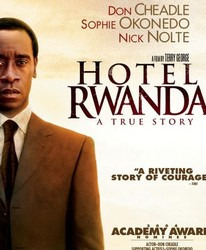
Hotel Rwanda was a dramatic film directed by Terry George in 2004. This movie told the real-life event through a hotel manager named Paul Rusesabagina's perspective. During the Rwandan genocide in 1994, tensions between the Hutus and the Tutsi’s tribe lead to this war. As the genocide was breaking out, there was no way for Paul Rusesabagina to escape as he was a Hutu, but his wife, Tatiana, was a Tutsi. Paul became a hero once he saved over 1200 Hutus and Tutsi refugees from the Interahamwe military. The Interahamwe was the ruling party of Rwanda at that time and were the leading criminals of the genocide as they killed over 500,000 Tutsi’s. Hotel Rwanda had an intense and emotional mood with the use of some film techniques such as physical relations and Film music. As the Interhamwe group was roaming the streets, you could see how helpless the refugees were. They were unable to protect themselves, and in some scenes, the Interahamwe militia was holding a gun right into their face. You can see that in those scenes, physical relations played a massive part as you know the connection between the refugees and the militia. The film music in Hotel Rwanda was sombre and depressing as it correlates to the mood of the film. The Rwandan genocide was a terrible place for both parties and fundamental human rights began to change into their privileges. The human rights of having shelter, food, healthcare and safety were stripped entirely from all the refugees. Paul Rusesabagina not only hid 1200 refugees, but he also provided them with basic necessities such as food and water.
Overall after watching this exceptional documentary, I believe that Paul Rusesabagina was a true hero, and his character development throughout the movie was genuinely inspirational. At the beginning of the film, Paul was self-centred and only cared about the safety of his wife and their 4 kids but later had empathy for the helpless refugees. As the Rwandan genocide was between the two different tribes, regardless of Paul being part of the Hutu tribe, he did everything in his power to help all the refugees, even if they were from the opposing tribe. I am a huge horror movie fan, but the violent scenes where refugees being beaten were really heartbreaking. This movie helps me reevaluate my life and be grateful for having fundamental human rights. The target audience of Hotel Rwanda should be 18+ as there is a combination of a lot of violent scenes, and people need to grasp the Rwandan Genocide information. I would overall recommend this movie for adults wanting to learn more about the genocide and understand that we do not live in such a utopian world where everything is perfect. The sad reality of the hardships that the Rwandans had to go through were terrible and that the US could have saved many more lives if they send as little as a few thousand troops. In conclusion, I give this documentary a 4.5/5.0 stars.
1 note
·
View note
Photo
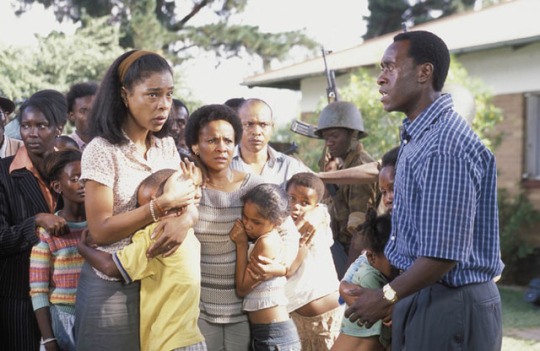
Hotel Rwanda Review - 7/10
In 1994 one of the world’s worst horrors in the history of mankind occurred in Rwanda. The Rwandan Genocide was when the Rwandan population that identified as Hutu murdered close to a million people that identified as Tutsi, while the rest of the world observed and refused to help. The movie Hotel Rwanda by Terry George tells the story of Paul Rusesabagina, a humble hotel manager that courageously shelters thousands of people in the Hotel Des Milles Collines. Paul is a normal good-hearted person that is able to see that labels like Hutu and Tutsi mean nothing, he is married to Tatiana, a Tutsi woman. Unfortunately, not all Hutus are like Paul, he is considered a moderate Hutu who is just as hated as Tutsis. In the film, Paul is able to save many people by selflessly giving up his hard earned riches to buy Tutsi lives. Through his connections that he has made at the hotel with rich and powerful people, he is able to stall the massacre that looms over them. With the help of UN General Roméo Dallaire and other influential individuals, Paul was able to ward off the Interahamwe and successfully lead the helpless to safety.
For the most part, I enjoyed Hotel Rwanda it started off very similarly to the way a horror movie would, which is expected considering the events that occurred. Without question, the way the movie began was appealing to me as I have a soft spot for horror films. The way that George was able to cock the gun of suspense had me itching for the initial twenty minutes of the movie. Having some previous knowledge I already knew what was going to happen but, somehow I was kept in denial along with all the other characters. Once the atrocities began it was terrifying, the feeling of confusion, fear, and distraught could be felt through the cries of the children. Overall the beginning part of the movie was very effective in its ability to make the viewer empathize.
The actual history of the event lent itself very well to the film however, it is not entirely historically accurate. This seems like it was done to make the movie more Hollywood, as I have never actually been to Rwanda the background seemed convincing. I would expect Rwanda to be dry and exactly how it was portrayed in the movie but Rwanda is actually much more green and I would have preferred that in the film. A few characters were also misportrayed in the film, the first that comes to mind is Roméo Dallaire. In Hotel Rwanda he looks like a retiree, and he acts very unpassionately which is not at all the way he actually was. These inaccuracies turned me off to the film a bit. Generally, the film was enjoyable, a bit long, but that can not be helped. Hotel Rwanda deserves an 7/10 as it had an exceptional story paired with a thriller-like tone. I would recommend this film to anyone that lives in a first world country and to the new generations of teenagers. It is necessary that we are aware of this event and it is our responsibility to ensure does history does not repeat itself.
4 notes
·
View notes
Text
Which star was Oscar-nominated for his role in the film 'Hotel Rwanda'?
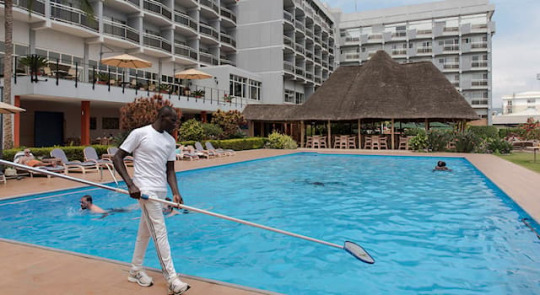
Don Cheadle was nominated for an Academy Award for Best Actor for his lead role as Rwandan hotel manager Paul Rusesabagina in the historical genocide drama film 'Hotel Rwanda' (2004). Set in 1994, Paul Rusesabagina (Cheadle) runs the 'Hotel des Mille Collines', a popular, European-owned establishment in the Rwandan capital of Kigali. Paul is a member of the Hutus, the majority group in power, but his wife, Tatiana (Sophie Okonedo), belongs to the minority Tutsi group. The division between the two groups deepens after the Rwandan president is assassinated. Paul must work harder to pacify the people he deals with for business and maintain the illusion of a functioning hotel while harbouring refugees.
Paul Rusesabagina (born 1954) is a real person. He is known for hiding and protecting 1,268 people during the 1994 Rwandan genocide. On 20th September 2021, several years after the making of 'Hotel Rwanda', he was found guilty of terrorism-related charges. During the court proceeding, he denounced president Paul Kagame and reported that he had been abducted from exile to stand trial in Rwanda.
Donald "Don" Cheadle (born 1964) is an American actor, author, director, producer and writer. He has made appearances in several films, including 'The Family Man', 'Ocean's Eleven', 'Crash', 'Traitor', ' Iron Man 2', 'Iron Man 3', and the 'Avengers' series.
0 notes
Text
Hotel Rwanda
Rating 7.4/10
Terry George’s Hotel Rwanda chronicles the Rwandan genocide from the perspective of Paul Rusesabagina, a Hutu hotel manager who houses over a thousand Tutsi refugees. Don Cheadle plays Rusesabagina in a stunning Oscar nominated performance. The film shows what went on in the genocide but more so the heroics of Rusesabagina as he saves the lives of many during such a tragic event that was hidden from the rest of the world for a long time.
The film takes place in Rwanda during the genocide that took place in 1994. A really cool part of the film is that while most of it takes place in the Hôtel des Mille Collines in Rwanda’s capital city Kigali, that Rusesabagina works at, the parts that are outside of the hotel play a fantastic role in illustrating the devastation that the genocide caused. The film starts with the Hutu radio show exclaiming their hatred towards the Tutsi in an introduction to the conflict for any viewers without prior knowledge. We then see the rather luxurious parts of business that Rusesabagina is involved in with him picking up expensive cigars and talking about the wealth that they represent. He smokes these cigars with a very significant person named George Rutuganda who is a Hutu extremist that leads the local anti-Tutsi militia called the Interhamwe. This interaction explains Paul’s position in the issue where he declines to be involved in Hutu rallies. Paul then buys beer from him but during that process a crate full of machetes is dropped striking fear into Paul’s driver Dube. Once the conflict really starts to pick up we saw the beginning of a horrifying genocide. Throughout the genocide we meet many other characters including Paul’s wife Tatiana, who is a Tutsi. We also meet Nick Nolte’s character Colonel Oliver who leads the United Nations peacekeeping force. Rusesabagina takes in over a thousand refugees with many of them flowing in from the United Nations camp. The film shows that the United Nations were not allowed to intervene and help protect the Tutsi but only to a certain extent which is something I dislike about the movie as it should be highlighting how the world poorly reacted to the genocide.
Overall, Terry George’s film was very well put together with a fascinating yet devastating true story being shown. It is a very emotional film with such a sad truth about the world being told but the high production value of the movie makes it very entertaining. The main knock I have on this movie is the lack of information about the genocide itself. The topic is not shown in great enough detail for what I believe to be because of the lack of interest that it would garner from consumers. Another film that I have watched called Shake Hands with the Devil goes over the same topic of the Rwandan genocide but it provides a lot more information specifically regarding the United Nations failures which I think is very important to show. I would still definitely recommend watching Hotel Rwanda and rate it a 7.4/10.
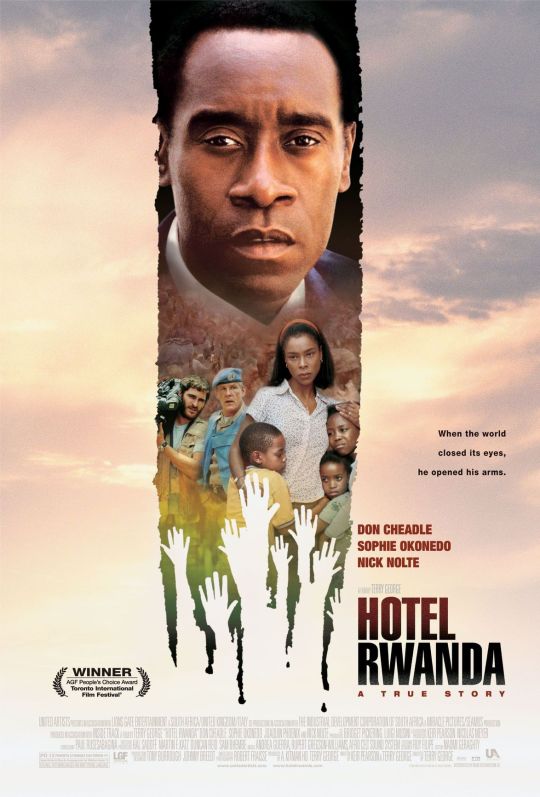
0 notes
Text
Bank Robbers Have Getaway Cars, Paul Rusesabagina's Kidnappers Had GainJet
Family, Legal Team of Illegally Extradited and Jailed Humanitarian File Lawsuit Against Complicit Aviation Company GainJet
SAN ANTONIO - Dec. 16, 2020 -- This morning the family and legal representatives of illegally extradited and jailed humanitarian Paul Rusesabagina held a virtual press conference to announce a lawsuit against aviation company GainJet for their role in kidnapping Hotel Rwanda hero Paul Rusesabagina. This case arises out of a conspiracy between the Rwandan government and defendant GainJet to engage in the unlawful extradition, arbitrary detention, and torture of Paul Rusesabagina.
In late August 2020, the international human rights icon whose story of saving 1,268 people during the Rwandan Genocide as told in the film Hotel Rwanda, was flown by GainJet against his will from Dubai, United Arab Emirates to Kigali, Rwanda. Paul boarded the GainJet flight expecting to travel to Burundi, where he believed he was going to speak at churches and public gatherings about his experiences with the Rwandan genocide at the invitation of Constantin Niyomwungere (the Bishop), who is also named in the lawsuit.
For years, Paul has been targeted by the Rwandan government for speaking out about human rights abuses perpetrated by the regime of President Kagame. Threats against him further increased as he became an internationally known humanitarian. Paul left Rwanda two decades ago, gaining Belgian citizenship and lawful permanent resident status in the United States where he has a home in San Antonio, Texas. Out of fear for his life, Paul previously swore never to return to Kigali while there is a brutal dictator in power but continued his life's work dedicated to bringing peace and democracy to Rwanda and motivating governments, nongovernmental organizations, and ordinary people to work together to prevent genocide throughout the world. He longed to be able to return to Rwanda but only when there is sustainable peace in both his homeland and the Great Lakes Region of Africa.
GainJet has previously run charters carrying President Kagame, including bringing him to the U.S. where he enjoys freedoms while at the same time behaving like a strongman dictator in Rwanda. The Africa base of GainJet's operations is in Rwanda with their main headquarters located in Athens, Greece.
"Transportation is the key element in a kidnapping and GainJet was the only reason Paul was able to be successfully and illegally taken to Rwanda. There is proof that the invoices from GainJet were paid for by the government of Rwanda. Bank robbers use getaway cars, Kagame used GainJet," said lead attorney Robert Hilliard of Texas-based Hilliard Martinez Gonzales LLP. "The wrongful kidnapping of Paul Rusesabagina, international human rights icon and U.S. Presidential Medal of Freedom recipient, is a world issue. As the Rev. Martin Luther King recognized 'injustice anywhere is a threat to justice everywhere.'"
"GainJet had an independent responsibility as an international jet charter service to protect the safety of all of their passengers, not just those paying the bills. Paul has confirmed that while he was on the GainJet flight, he was bound and tied before it landed in Rwanda. Despite this, GainJet and its employees and agents did not issue any international 'Mayday' call or 'squawk '7700" on the radio — the internationally recognized code for distress or an emergency situation in flight. The pilots had to know they were taking part in a kidnapping," added Hilliard.
The complaint was filed in federal court in San Antonio, Texas. View Rusesabagina Complaint Against GainJet (https://hotelrwandarusesabaginafoundation.files.wordpress...).
"In a world increasingly beset by false narratives, manufactured ambiguity, and fake news, the legal system and lawsuits like this one become even more important. We are going to shine a lot of light on this situation. And I think the facts will show that Paul Kagame is a tyrant, not a president, that Constantin Niyomwungere is a criminal, not a Bishop, and that GainJet is better described as a flying prison cell than a private jet charter," said attorney Nicholas Shadowen of Hilliard Shadowen LLP.
Attorneys Robert Hilliard of Hilliard Martinez Gonzales LLP and Nicholas Shadowen of Hilliard Shadowen LLP were joined at the virtual press conference by Paul's wife Tatiana Rusesabagina and two of his adult children, Anaïse Kanimba and Roger Rusesabagina. Participants also included Dr. Brian Endless, a political science professor at Loyola University-Chicago and senior adviser for the Hotel Rwanda Rusesabagina Foundation and moderator Kitty Kurth, president of Kurth Lampe Worldwide, an international public affairs firm that has represented Paul Rusesabagina for over a decade.
A recording of the press conference can be viewed on the #FreeRusesabagina Facebook page:
https://www.facebook.com/FreePaulRusesabagina
#FreeRusesabagina
Website: www.hrrfoundation.com Twitter: @freethehero Facebook: @FreePaulRusesabagina Instagram: #FreeRusesabagina TikTok: #FreeRusesabagina
0 notes
Photo
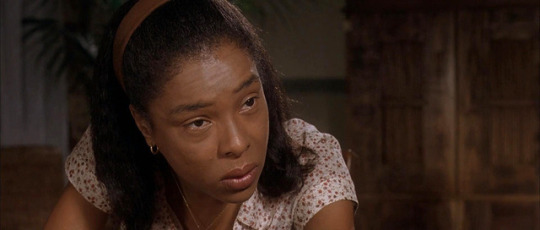
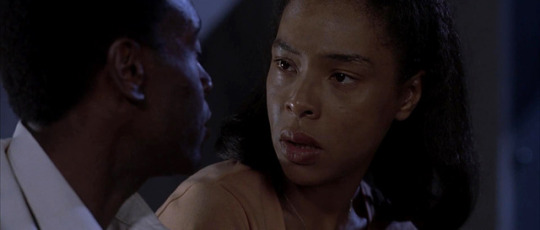
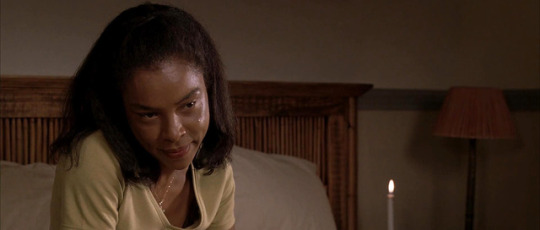
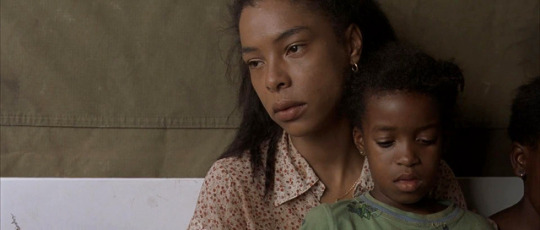
Sophie Okonedo as Tatiana Rusesabagina / Hotel Rwanda (2004)
Academy Award Nominated as Best Supporting Actress
52 notes
·
View notes
Text
imagine if ppl put the same logic of the hamilton fandom onto hotel rwanda and there were people kinning paul rusesabagina and looking for their tatianas or shipping paul with bizimungu
11 notes
·
View notes
Text
The Mega Universe Authority Part 8 (Silver and Black)
Part 8! Only one left! We are getting close to the end! Here’s Silver and Black Diamond!
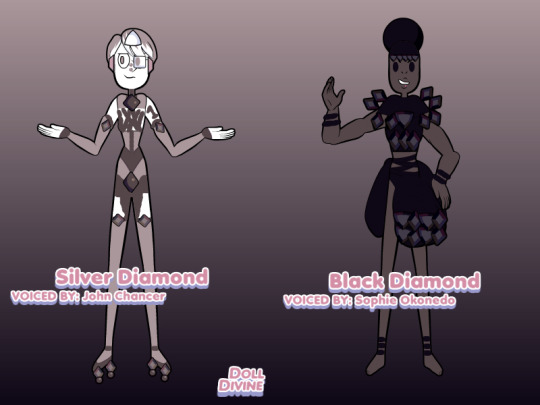
Silver Diamond.
Pronouns: He/Him/They/Them
Personality: Sarcastic/Understanding/Emotionless
Weapon: Lightsaber that can become a katana or a knife
Other Abilities: Telekinesis
Fusion Dance: House Dance
Based Off: Vocaloids
Glados (Portal) (Special thanks to LadyOfTheGeneral for the inspiration! Link to the inspiration for Silver’s design here: https://www.deviantart.com/ladyofthegeneral/art/GLaDOS-human-designs-362271348
Hal 9000 from 2001: A Space Odyssey.
Theme: https://www.youtube.com/watch?v=Pej2wjuRT9o
Voiced By: John Chancer (Snufkin in The Moomins)
https://www.youtube.com/watch?v=gHDZOqlp2jg
Black Diamond
Pronouns: She/Her/They/Them
Personality: Eerie/Patient/Insensitive
Weapon: Club that can turned into a Spiked Club
Other Abilities: Erebokinesis
Fusion Dance: Tribal
Based Off: African Tribes
Jack Skellington (The Nightmare Before Christmas)
Theme: https://www.youtube.com/watch?v=OcPnzXaSkLs
Voiced By: Sophie Okonedo (Tatiana Rusesabagina in Hotel Rwanda)
https://www.youtube.com/watch?v=ozJZWW0kcJA
0 notes
Text
Hotel Rwanda Review
Personal Rating 8/10

The Hotel Rwanda is a film based on the Rwandan genocide of 1994. More than 800,000 Rwandan citizens were massacred by running battles between the Hutus and Tutsis. The war between Hutus and Tutsis is fuelled by corruption and bribery that marks the country's political scene. It traces back to Rwanda's colonizing Belgians. Hotel Rwanda isn't the story of that massacre. It is the story of a hotel manager who saved the lives of over 1,200 people by being, essentially, a very good hotel manager. He was caring and selfless, his name is Paul Rusesabagina, who is played by Don Cheadle as a man of calmness, and hopefulness in a period of confusion. This is not the kind of man the audience is supposed to understand at the beginning but throughout the film, it shows how he can work things work in reality, who uses his aptitudes of pay off, sweet talk, and smarts to get out of some situations while saving lives.
He is a Hutu but his wife Tatiana is a Tutsi. His children are a mix. The Hutus are the majority of the Rwandan population, they blamed the Tutsis (the minority) for the murder of their president and began to murder all Tutsi citizens. When the genocide started lots of neighbors especially Tutsis hid out in his hotel for the safety of their families, but when the neighborhood became destroyed by the Hutu rebels Paul had to bribe the head Hutu officer to safely escort him to his family and friends in his hotel. Since the hotel was guarded by United Nations Peacekeepers, lots of other Tutsi citizens began to take cover in it, bringing the hotel much over the normal capacity. When the violence began to increase the United Nations peacekeepers left the country out of fear only leaving back around 300 men to serve in the genocide. This film shows many acts of courage and sacrifice as Paul risks his life several times for his Tutsi friends and family as well as his on Hutu friends. I love this film because it relates to the genocide but it also gives a sense of how positivity and love are the main two mindsets you must have to go throughout the hard times. It is an emotional film how so many innocent men and women were killed for no reason but Paul really pushes through the hard times with positivity and it makes you kind of forgot the horrible history the film is really about. People don't necessarily realize the impacts fighting and genocides have on innocent people. It tears apart families, ruins the environment and homes that people once felt safe in, it emotionally scars people and leaves them with nightmares. This movie was amazing because it visually explains exactly what happened during the Rwandan genocide. It shows the perspectives of the victims of the horrible event and how they sacrificed many things in their lives to protect themselves or the people they loved. Overall this movie is amazing and despite the sad and horrific history that is shown throughout the film there is positivity and love spread throughout the hotel where Paul manages and it shows you how one person can make a big difference.
0 notes
Text
Hotel Rwanda Movie Review
Rating: 8/10
In 1994, the tensions between the Hutu controlled government and Tusti rebels led to genocide in Rwanda. Paul Rusesabagina, a Hutu manager of the Hotel des Mille Collines, is married to his wife Tatiana who is a Tutsi. Their marriage is a source of conflict with Hutu extremists, including Georges Rutaganda who is a goods supplier to the hotel who is also the local leader of Interahamwe, a brutal Hutu militia. Following the assassination of the president who is a Hutu, Paul and his family observe neighbors beingh killed, which started the early stages of the genocide. When Civil war breaks out, the Rwandan Army Captain threatens Paul and his neighbours, which he then barely negotiates their safety and brings them to the hotel. The UN peacekeeping forces are forbidden to intervene in the conflict and prevent the genocide. The foreighn nationals were evacuated but the Rwandans were left behind. More and more evacuees arrive at the hotel from the overburdened UN refugee camp, the Red Cross and various orphanages which totaled about 800 Hutu and Tutsis. As the situation increased, Paul had to divert the Hutu soldiers, care for the refugees and maintain the appearance of a functioning 4 star hotel.
When they get low on supploised, Paul and Gregoire drive to acollect hotel supplies from one of the Hutu extremists, Georges Rutagand. On their way, they witness Tutsi hostages being raped by the Interahamwe militia. Georges explains to them that the “rich cockroaches” money is going to be valueless because all the Tutsis will be dead. Paul expresses his concerns and disbelief that the Hutu extremists will wipe out all of the tutsis but Georges replies that they're halfway there already and that they’ll continue. After the encounter, Paul and Gregoire leave and as they’re driving back to the hotel, they drive through the riverside road, recommended by Georges, only to find that there are dead bodies everywhere.
When the UN forces attempted to evacuate a group of refugees, Gregoire betrayed them to the Interahamwe. Soon afterward, all the hotel refugees are able to leave the hotel in a UN convoy. They travel through retreating masses of refugees to reach safety behind Tutsi rebel lines and are reunited with family and friends. The end card explains that Paul saved 1,200 Tutsi and Hutu refugees. His family moved to Belgium. The genocide came to an end in July 1994, at least 1 million people died in the genocide.
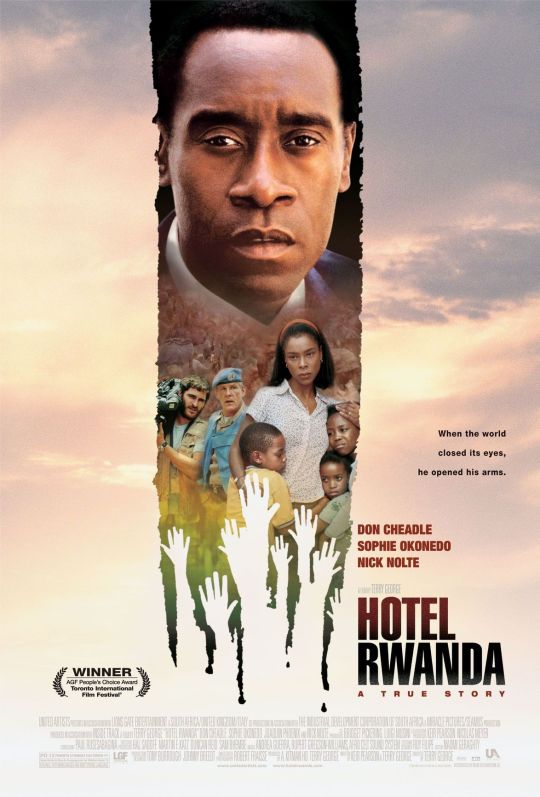
0 notes